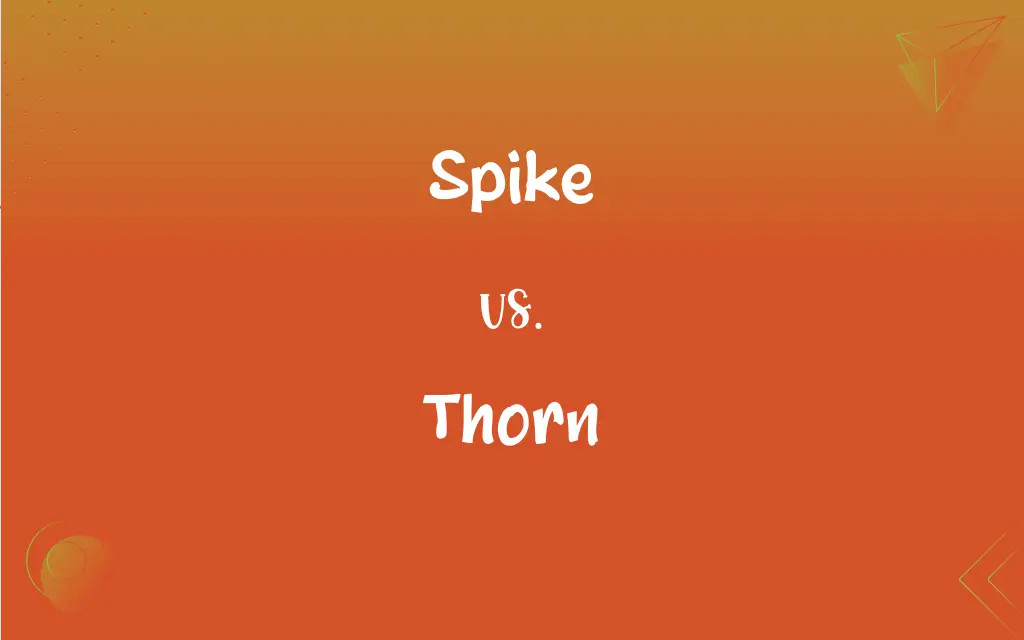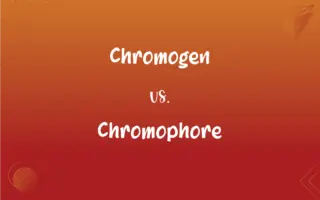Spike vs. Thorn: What's the Difference?
Edited by Janet White || By Harlon Moss || Updated on November 9, 2023
A spike is a sharp-pointed object, often long and thin; a thorn is a stiff, sharp-pointed, woody projection on a plant.

Key Differences
"Spike" can refer to a sharp increase in the magnitude or concentration of something, whereas "thorn" is specifically a natural, sharp extension of a plant's stem or branches. While a spike might be found in many contexts, such as a graph, a volleyball play, or as part of a fence, a thorn is exclusively botanical, part of a plant's defense mechanism.
A "spike" can also describe objects like nails or the pointed ends of railings designed to deter climbing. On the other hand, "thorn" is used to describe the natural, pointed defense found on plants like roses. A spike is often manufactured and has a variety of applications, while a thorn is naturally occurring.
In athletic terminology, "spike" is used to describe a forceful hit, typically in volleyball or football. In contrast, "thorn" has no such connotations with sports and maintains its association with plants and the discomfort it can cause when touched.
A "spike" might also refer to a sudden and temporary change, as in a spike in temperature or a spike in electricity. A "thorn," metaphorically, can refer to a persistent problem or annoyance, symbolizing the lingering discomfort it can cause, similar to its physical form which can embed itself in skin and cause pain.
"Spike" has a broader, more versatile usage, describing various types of pointed objects or sudden peaks. A "thorn" is more specialized, usually referring to the sharp outgrowths from plants that can cause pain upon contact and metaphorically, to a persistent issue.
ADVERTISEMENT
Comparison Chart
Definition
A sharp-pointed object or a sudden increase
A stiff, sharp-pointed part of a plant
Origin
Can be natural or man-made
Naturally occurring on plants
Usage in Context
Broader usage in various fields
Specific to botany and metaphors
Associated with
Objects, trends, or actions
Plants and metaphoric nuisances
Function
Can be structural or descriptive
Defensive for plants, symbolic in language
ADVERTISEMENT
Spike and Thorn Definitions
Spike
A sharp-pointed piece of metal.
He hammered the spike into the ground.
Thorn
Something that causes distress or irritation.
His lack of punctuality was a thorn in her side.
Spike
A sudden increase in magnitude.
The company saw a spike in sales this quarter.
Thorn
A pointed difficulty or problem.
The unresolved issue became a thorn in the negotiations.
Spike
A pointed projection on athletic footwear.
Her running shoes had spikes for better traction.
Thorn
A stiff, sharp-pointed, woody projection on plants.
The rose bush was full of thorns.
Spike
A sharp rise in a graph.
There was a noticeable spike in temperature readings.
Thorn
A metaphor for a persistent problem.
The unresolved dispute stood as a thorn between the friends.
Spike
To add a strong or stimulating substance to.
He spiked the punch at the party.
Thorn
A botanical defense mechanism.
Thorns protect the plant from being eaten by animals.
Spike
A long, thick, sharp-pointed piece of wood or metal.
Thorn
A modified branch in the form of a sharp woody structure.
Spike
A heavy nail.
Thorn
Any of various other sharp protuberances, such as a spine.
Spike
A sharp-pointed projection along the top of a fence or wall.
Thorn
Any of various shrubs, trees, or woody plants bearing such sharp structures.
FAQs
Can a spike be natural?
Yes, spikes can be natural, as in the case of certain animal defenses or ice formations.
Is a spike in data always bad?
Not necessarily; it can indicate a positive surge, depending on the context.
Do thorns serve a purpose for plants?
Yes, they primarily serve as a defense mechanism against herbivores.
Do spikes always indicate danger?
Often, but not always; spikes can also be used in sporting equipment for performance.
Can thorns be artificial?
Artificial thorns can be created, but naturally, thorns are always real and part of a plant.
Can a person be a spike in a group?
Metaphorically, if they cause a sharp change or disruption, they might be considered a spike.
Are all thorns harmful?
Not all thorns are harmful, but they can cause discomfort or injury if touched.
Can thorns be removed from plants safely?
Yes, with proper tools and care, thorns can be removed without damaging the plant.
Can human-made items have spikes?
Yes, many human-made items, like fences or weapons, have spikes.
Is a "thorn" ever used in a positive context?
It's uncommon, as "thorn" usually refers to something negative or bothersome.
Are thorn metaphors used for positive aspects?
Rarely, as thorns typically symbolize difficulties or challenges.
What is a spike protein?
A spike protein is a protein on the surface of certain viruses that allows them to attach to and enter host cells.
Can the term "spike" refer to a verb?
Yes, "to spike" can mean to impale or to cause a sudden increase.
What does "spike a story" mean in journalism?
It means to reject a story or to decide not to publish it.
Is "thorny" used to describe actual thorns only?
"Thorny" can describe real thorns or figuratively to describe a difficult situation.
What does it mean when someone is described as "a thorn in one's side"?
It means they are a constant source of annoyance or trouble.
How do you handle a spike in demand?
It requires strategic planning and resource management to accommodate the surge.
Are thorns only found on roses?
No, thorns can be found on various plants, not just roses.
Are there plants without thorns that are still protective?
Yes, some plants use chemicals or other physical structures like spines for protection.
Can you spike someone's interest?
Yes, to spike interest means to cause a sudden increase in curiosity or attention.
About Author
Written by
Harlon MossHarlon is a seasoned quality moderator and accomplished content writer for Difference Wiki. An alumnus of the prestigious University of California, he earned his degree in Computer Science. Leveraging his academic background, Harlon brings a meticulous and informed perspective to his work, ensuring content accuracy and excellence.
Edited by
Janet WhiteJanet White has been an esteemed writer and blogger for Difference Wiki. Holding a Master's degree in Science and Medical Journalism from the prestigious Boston University, she has consistently demonstrated her expertise and passion for her field. When she's not immersed in her work, Janet relishes her time exercising, delving into a good book, and cherishing moments with friends and family.































































